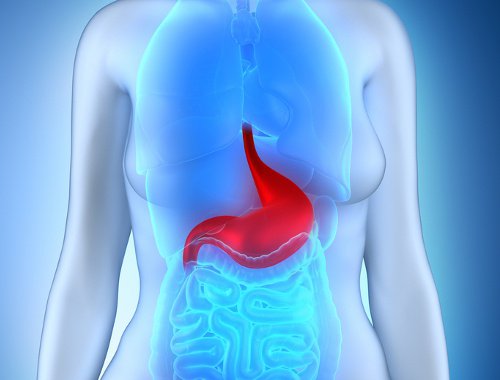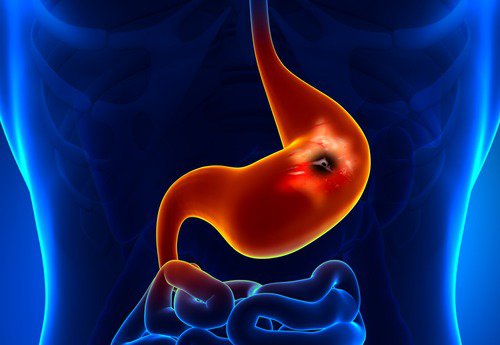Possible Symptoms of a Stomach Ulcer


Written and verified by psychologist Valeria Sabater
Stomach ulcers. No doubt you’ve heard of this annoying problem before, in which a sore develops on the lining of the stomach or the intestine. Ulcers can cause severe pain, and often appear during stressful situations, but that doesn’t have to always be the case. This is why it’s important to know all of symptoms of a stomach ulcer.
In today’s article we’ll talk about them –also known as peptic ulcers– and focus mainly on the symptoms so you’ll be able to recognize them better. Are you ready to learn?
What’s a peptic, or stomach ulcer?
Stomach ulcers occur quite frequently. They can appear thanks to your lifestyle not being as healthy as it should be. And problems arise when a sore forms on the mucus lining of your stomach or the upper part of your small intestine (also known as the duodenum).
This sore, or ulcer, originates when there’s a sudden change in your digestive process. The secretion of too much stomach acid, for example, can cause these sores.
It might also surprise you to know that according to the statistics, nearly 20% of the world’s population suffers from this problem. You need to be careful, because if left untreated, stomach ulcers can lead to more serious complications.
What causes a stomach ulcer?

But try to remember that this isn’t always the case. Bacteria is far more responsible (in most cases) for ulcers.
Some other things that may cause stomach ulcer are:
- Do you take ibuprofen on a regular basis for pain? If you do, be careful, because long-term consumption of large amounts of ibuprofen can alter your body’s secretion of stomach acids and lead to ulcers.
- The use of tobacco products is another major culprit. If you’re still smoking those horrible cigarettes, it’s time to put your health first. It’s worth it!
- Regular alcohol consumption and eating acidic or very spicy foods can eventually cause you to suffer from stomach ulcers.
- Stress is one final factor to consider, but as we said above, it’s never 100% of the cause. People who have very low-stress lifestyles and no anxiety can also suffer from stomach ulcers.
Read also:
Symptoms of a stomach ulcer

This is a serious condition, so keep the symptoms of a stomach ulcer in mind and don’t hesitate to tell your doctor about any discomfort, pain, or worry you have. Here we’ll outline a few more of the most common symptoms of a stomach ulcer:
1. A feeling of being “stuffed”
Maybe you just ate, and now your stomach feels full and hard, as if you’ve eaten far too much and can barely breathe. If this happens to you often and not just every once in a while, go see your doctor.
2. Hiccups, belching, and gas
Do you go through a long process after eating that starts with the hiccups, followed by uncontrollable burping, and finally a few hours later you experience gas? It could be an ulcer.
3. Abdominal pain
Pain or a burning sensation that’s especially concentrated around the navel and belly and doesn’t respond to any other treatment could be a problem. If it lasts for more than a week, it’s time to see a doctor.
4. Feeling very hungry for short periods of time
One strange side effect of a stomach ulcer is that after eating, you might experience that “stuffed” feeling for a few hours, but then suddenly and without warning you are ravenous again. This is actually false hunger, caused by an excess of stomach acid irritating your ulcer.
5. Nausea and weight loss
These are more advanced symptoms of a stomach ulcer that should definitely put you on alert. No one loses weight without a reason. It’s a clear sign that you’re not getting the nutrition that your body needs, or that your digestive system isn’t working properly.
If nausea or vomiting is also present, these are even more obvious signs of a possible ulcer. Don’t delay – go see your doctor!
6. Vomiting blood
This is an unmistakable sign that your ulcer has already eroded your stomach lining or the wall of your duodenum. If this happens, go directly to the emergency room. Stay calm –you know that a stomach ulcer can be treated.
With the right medication and some changes to your diet and lifestyle, you can turn this around very quickly. The important thing is to recognize the severity of your symptoms so you can respond immediately.
All cited sources were thoroughly reviewed by our team to ensure their quality, reliability, currency, and validity. The bibliography of this article was considered reliable and of academic or scientific accuracy.
- Nirula, R. (2014). Gastroduodenal Perforation. Surgical Clinics of North America. https://doi.org/10.1016/j.suc.2013.10.002
- Fischbach, W., Malfertheiner, P., Hoffmann, J. C., Bolten, W., Kist, M., & Koletzko, S. (2009). Helicobacter Pylori and Gastroduodenal Ulcer Disease. Deutsches Aerzteblatt Online. https://doi.org/10.3238/arztebl.2009.0801
- Kandulski, A., Selgrad, M., & Malfertheiner, P. (2008). Helicobacter pylori infection: A clinical overview. Digestive and Liver Disease. https://doi.org/10.1016/j.dld.2008.02.026
This text is provided for informational purposes only and does not replace consultation with a professional. If in doubt, consult your specialist.








